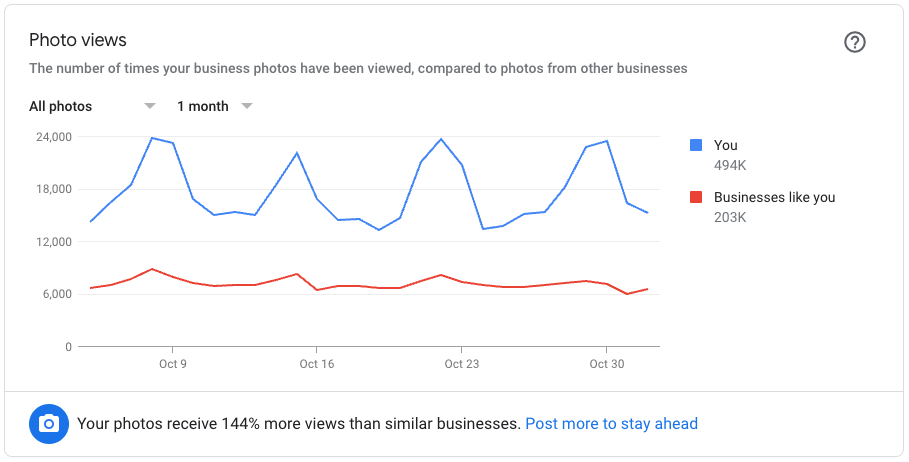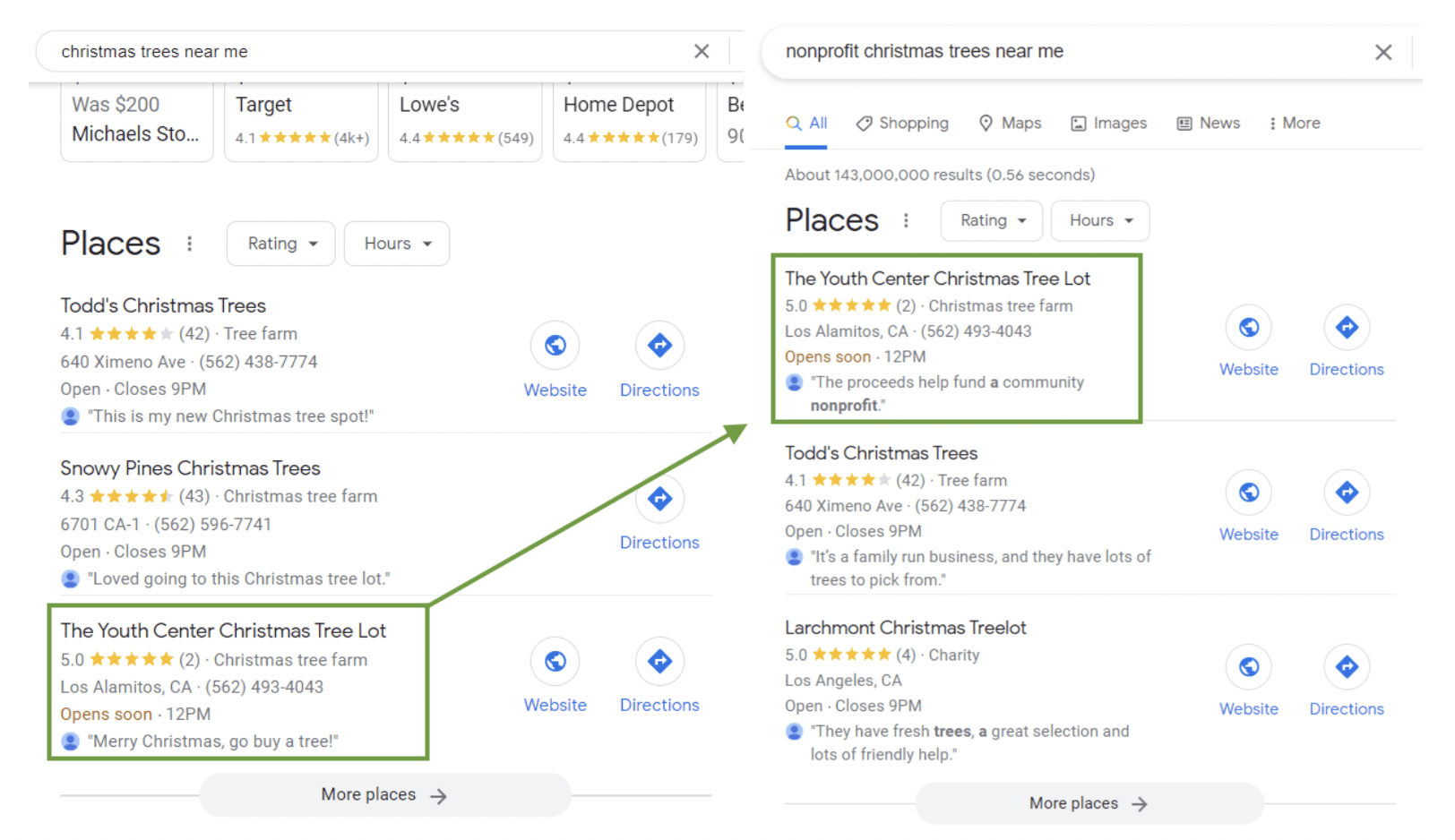Local Memo: Google Launches New Shopping Features for the Holidays
In this week’s update, learn about Google’s new shopping features for the holidays; more users being pushed to the GBP Search interface; the question of review text as a ranking factor; the diminishing importance of backlinks; semantic photography in search; and a volatile first week for Twitter’s new regime.
Google Launches New Shopping Features for the Holidays
Google has announced an array of new shopping features as we head into the holiday season. According to Google’s own research, 43% of shoppers plan to look for deals and sales more than they did last year. In light of this, Google is launching new labels for coupons and deals in product search results, allowing users to easily copy and use coupon codes. A new comparison feature that sounds especially useful will help shoppers compare prices for the same product from different retailers. Along the same lines, a price insights feature will tell you whether the price at a particular retailer is high, normal, or low compared to other retailers.
As Andrew Hutchinson points out in Social Media Today, these tools could prove valuable not only to consumers searching for deals, but also to retailers who will have a new level of insight on the pricing and promotional activities of competitors. The new features further extend Google’s efforts to transform the SERP into a shopping destination emphasizing both ecommerce and local product inventories.
Courtesy Google
Google Pushing More Users to GBP Search Interface
In what must be one of the slowest rollouts in Google history, another significant wave of users is reporting that they are now being forced over to the new Search interface to edit individual Google Business Profiles, with access to the Google Business Profile Manager dashboard becoming restricted to a few features such as showing an aggregated list of the businesses you manage. When I first encountered this behavior myself back in August, I was told by a few other users that they were seeing the same thing, but many more seem to be experiencing the change now for the first time.
And this is causing some consternation, since Google has not yet rolled out all features to Search that were available in the old dashboard. In fact, Joy Hawkins has shared some intel, presumably direct from Google, indicating that the photo metrics in the old Insights page will not be transferred to the new Performance page in Search, where some of Google’s reinvented and reorganized metrics can already be found. It remains to be seen (though I have heard doubts) whether other metrics we’ve come to rely on, such as Discovery, Direct, and Branded searches, will appear in the new interface.
From an integration perspective, the new Performance API launched in June also excludes the Insights metrics that were a part of the legacy GMB API. The legacy API does not yet have a firm sunset date, but at some point it will be deprecated and we’ll be left with whatever state the new Performance API is in at that point.
Example of photo metrics in the legacy dashboard that are not included in Search
Does Review Text Influence Ranking?
Joy Hawkins has published a new study which concludes that text in Google reviews does not have an influence on local rankings. For the study, Hawkins had several people post reviews of a Christmas tree farm that contained keywords like “Christmas trees” and “fresh trees.” Ranking grids captured in May and again in August showed no positive change in ranking for the terms “Fresh Cut Christmas Trees” and “Christmas Trees.” Hawkins concludes that businesses should not be encouraged to ask reviewers to mention specific phrases in hopes of boosting ranking.
It’s worth noting, though, that evidence does suggest businesses can rank for niche terms specifically because those terms appear in reviews. Our own Mike Snow came up with the example below, showing that a review mentioning the nonprofit status of a Christmas tree farm does seem to influence its shift from third to first position for the search “nonprofit Christmas trees near me.”
Links May Be Less Important in Google’s Future
Google will probably rely less and less on backlinks as a ranking factor as time goes on, according to a recent statement from company search spokesman John Mueller. He suggests that even today, the company is relying less on links to rank websites than it did in the past. Links will probably never go away as a point of reference for ranking — after all, Mueller says, “how do you find a page on the web without some reference to it?” — but as Google’s sophistication in understanding content increases, reliance on links will naturally decline.
In another sign of the evolution of Google’s search algorithm, an article from Wix’s Mordy Oberstein suggests that Google may be moving away from releasing time-based algorithm updates and toward an algorithm that continuously updates itself, conducting what Oberstein calls “continuous real-time recalibration.” Such a scenario leads to a constant state of rank fluctuation, since the algorithm is constantly making adjustments. Oberstein points to data showing that ranking volatility has become more frequent, but less severe, in recent years.
Semantic Photography and the Future of Search
Mike Blumenthal prefaces a discussion of “semantic photography” in local search by quoting Google VP Jerry Dischler, who said in May that the company is “transforming the SERP into an endless stream of visual ideas.” Blumenthal claims that 38% of the pixels in a mobile search page are now occupied by images. Image-based search results are being matched to search intent using Google’s Vision AI technology. For this reason, Blumenthal argues, marketers have a great opportunity to augment business listings, product listings, and websites with photos depicting the products and services they want to rank for. Google will also tend to favor user uploaded photos, so businesses should encourage customers to take pictures of items they want featured. Authentic photos taken at the business location perform better than stock photos, according to research cited by Blumenthal.
Musk Moves Quickly to Remake Twitter
Elon Musk’s volatile first week as the owner of Twitter was capped off on Friday by the news that roughly half of the company’s workforce — an estimated 3,700 employees — had been abruptly laid off. Previously, Musk had hinted that he might get rid of as much as 75% of the company’s employees. This dramatic move followed several days of news about Twitter’s possible near term plans to produce more revenue, many of which would alter the platform drastically. These include a new $8 per month subscription model for verified profiles; a paywalled video feature that would let creators charge to view long-form content; paid DMs, allowing users to message people who don’t follow them; and gamification features to increase engagement.
Over the weekend, news emerged that the company was ready to launch the $8 subscription feature but would delay its release until after the election due to concerns that it could be “misused to sow discord,” in the words of Bloomberg News. The same article reported that some laid off employees were being asked to return to work.
Meanwhile, researchers have found that the incidence of hate speech on Twitter spiked after the acquisition, presumably in response to Musk’s suggestions that Twitter would moderate speech less strictly than before. Advertisers have signaled their concerns about the platform’s volatile state by withdrawing ad spend, with some agencies advising brand clients to pause Twitter spending entirely until stability is restored.
Damian Rollison
Subscribe to Local Memo!
Signup to receive Local memo updates and the latest on localized marketing, delivered weekly to your inbox.


